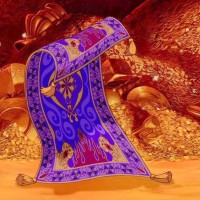Top 10 Most Common Disney Movie Clichés
Many Disney movies have featured many overused cliches.Perhaps the oldest and most overused cliché dates back to when Walt Disney's mother died, resulting in almost every Disney movie having one or no parents or parents dying in the movie.
The exception is Hercules. His parents are gods, so they can't die and, therefore, don't die and are alive the entire movie.
Can we have a whole family in a movie like Inside Out did for once, Disney?
I love Disney movies with songs in them. It would be boring without them. Just don't watch The Black Cauldron - the movie is pointless, with no songs, just a waste of a movie and very disappointing.
Jesus, I hate musical movies like Frozen. It just makes us hate kids even more when they run around singing these annoying excuses for songs.
It wouldn't be a Disney movie without characters breaking out into song for no reason.
I have to point out that Snow White had a quite realistic body. However, her head was almost twice as big as would be proportional to the rest of her. There are some extreme cases such as Jasmine and Megara, but this has become less of an issue. It is not really the main problem when it comes to Disney.
Do you know how skinny Meg's waist is?
So many characters in Disney movies are too trusting when it comes to strangers, which is why they end up in the trouble that they get into. For example, Snow White biting into the poisoned apple from the Queen disguised as an old woman despite warnings by the dwarfs against strangers. Pinocchio trusting Honest John not once but twice. Tarzan foolishly trusting Clayton and getting his ape family captured.
Come to the shed, child.
Disney Princess: Okay.
When Anna fell in love in Frozen, she thought true love was something at first sight. But then Elsa pointed out by telling her she can't marry someone she just met. Elsa is wiser than Anna.
I'm all for killing off villains, but Disney can just have them be hit with magic and have it take away their powers without killing them.
Disney really loves killing off their villains in the most horrific and violent ways possible.
Everyone has to have some sort of talking animal or pet that seems to be smarter than the main character in Disney.
This actually isn't as common as people say. For quite a while now, Disney has practiced equal opportunity rescuing. It's funny you cited "The Little Mermaid," because Ariel saved Eric twice in that before he returned the favor. I can also cite Pocahontas saving John Smith, Mulan saving Shang, even Megara saved Hercules when she pushed him out of the way of that falling pillar.
I really hate when people complain about "female characters needing to be rescued," as if a woman can't be strong unless she's a physical god. The fact is, everyone needs help sometimes, whether they're a man or a woman, and complaining about who's doing the rescuing doesn't help anyone.
Disney's Hercules is based on Greek mythology.
Changing the source material is a common practice in adaptation. It isn't specific to Disney. Practically every studio does it. For example, Laika's Coraline made changes from the book, DreamWorks' Shrek bears only a passing resemblance to its book, and Warner Bros.' The Iron Giant barely resembles the book it's based on at all. This is not uncommon, and it's not always detrimental.
However, the manner in which Disney does it could be something worth criticizing. Frankly, there are some stories that Disney should just avoid adapting. If they have to alter so much about Heracles or Tarzan of the Apes or The Hunchback of Notre-Dame to fit their mold, then perhaps they shouldn’t adapt those stories at all. I think I might dislike Pocahontas the most because it was part of our history, and they treated it like just another fanciful fairy tale!
I wonder what’s next. Will Disney transform A Song of Ice and Fire into a 90-minute animated musical? Or perhaps a Disneyfied Berserk, where Griffith actually does nothing wrong? Or, imagine Disney creating a movie about 9/11 where the planes are controlled by an evil wizard and nobody dies! Because if the real story is too scary for children, modifying it makes it all acceptable, apparently.
I don't want to watch a movie and end up realizing that I was watching a lesson-in-your-face movie.
Ariel doesn't really learn anything. She just sort of wants to get something, and she gets it.
I'm fine with Vanellope being a Disney princess in the new Ralph Breaks the Internet film. She was annoying and whiny in the first film, but she seems okay in the trailers.
Is this what they refer to as a Movie Quit Scene? I joke about it sometimes with friends by suggesting there should be some kind of drug that prevents these kinds of quit scenes from occurring.

Just because something exists doesn't mean it needs a face.
Do we need to give Tumblr any more material?
Disney went too far with this category when Timon tries to sing Be Our Guest in The Lion King remake.
I'm all for empowering women, but don't do it like this, Disney.
Disney made Captain Marvel a Disney Princess. What?! And Elsa is the queen of SJWs.